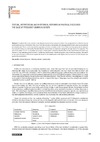Identificador persistente para citar o vincular este elemento:
https://accedacris.ulpgc.es/jspui/handle/10553/58607
| Campo DC | Valor | idioma |
|---|---|---|
| dc.contributor.author | Hernández Guerra, Concepción | en_US |
| dc.date.accessioned | 2019-12-16T18:27:52Z | - |
| dc.date.available | 2019-12-16T18:27:52Z | - |
| dc.date.issued | 2013 | en_US |
| dc.identifier.issn | 1886-2438 | en_US |
| dc.identifier.other | Dialnet | |
| dc.identifier.uri | https://accedacris.ulpgc.es/handle/10553/58607 | - |
| dc.description.abstract | A political discourse contains some features that must be constant in them to be recognized and understood by the audience as such but, at the same time, must fulfill the purpose of transmitting the message aimed in that venue with a personal and original style. This is commonly done through layers of direct or subtle content. One of the most important political orators in the twentieth century is undoubtedly President Barack Obama. Even his detractors recognize the high level of his speeches. The aim of this paper is to do a comprehensive analysis of the speech uttered by the President of the United States at Strasbourg, France in a very delicate political moment to reveal the rhetorical and intertextual means used to fulfill the purpose. The reason for his visit to Europe in 2009 was to explain the needs for the collaboration in the Afghan war in a moment in which Europe was against this participation. | en_US |
| dc.language | eng | en_US |
| dc.relation.ispartof | Revista de Linguistica y Lenguas Aplicadas | en_US |
| dc.source | Revista de lingüística y lenguas aplicadas [ISSN 1886-2438] (8), p. 59-65 | en_US |
| dc.subject | 57 Lingüística | en_US |
| dc.subject.other | Political discourse | en_US |
| dc.subject.other | Rhetorical analysis | en_US |
| dc.subject.other | Intertextuality | en_US |
| dc.title | Textual, intertextual and rhetorical features in political discourse: the case of president Obama in Europe | en_US |
| dc.type | info:eu-repo/semantics/Article | en_US |
| dc.type | Article | en_US |
| dc.identifier.doi | 10.4995/rlyla.2013.1175 | |
| dc.identifier.isi | 000214565800007 | |
| dc.identifier.url | http://dialnet.unirioja.es/servlet/articulo?codigo=4778189 | - |
| dc.description.lastpage | 65 | - |
| dc.identifier.issue | 8 | - |
| dc.description.firstpage | 59 | - |
| dc.investigacion | Artes y Humanidades | en_US |
| dc.type2 | Artículo | en_US |
| dc.contributor.daisngid | 9820316 | |
| dc.contributor.authordialnetid | 1110896 | - |
| dc.identifier.dialnet | 4778189ARTREV | - |
| dc.contributor.wosstandard | WOS:Hernandez-Guerra, C | |
| dc.date.coverdate | 2013 | |
| dc.identifier.ulpgc | Sí | es |
| dc.description.sellofecyt | Sello FECYT | |
| dc.description.esci | ESCI | |
| dc.description.dialnetimpact | 0,0 | |
| dc.description.dialnetq | Q2 | |
| dc.description.erihplus | ERIH PLUS | |
| item.grantfulltext | open | - |
| item.fulltext | Con texto completo | - |
| crisitem.author.dept | GIR Discourse, Communication and Society | - |
| crisitem.author.dept | Departamento de Filología Moderna, Traducción e Interpretación | - |
| crisitem.author.orcid | 0000-0001-9073-1736 | - |
| crisitem.author.parentorg | Departamento de Filología Moderna, Traducción e Interpretación | - |
| crisitem.author.fullName | Hernández Guerra, Concepción | - |
| Colección: | Artículos | |
Citas de WEB OF SCIENCETM
Citations
5
actualizado el 01-mar-2026
Visitas
49
actualizado el 14-oct-2023
Descargas
69
actualizado el 14-oct-2023
Google ScholarTM
Verifica
Altmetric
Comparte
Exporta metadatos
Los elementos en ULPGC accedaCRIS están protegidos por derechos de autor con todos los derechos reservados, a menos que se indique lo contrario.
